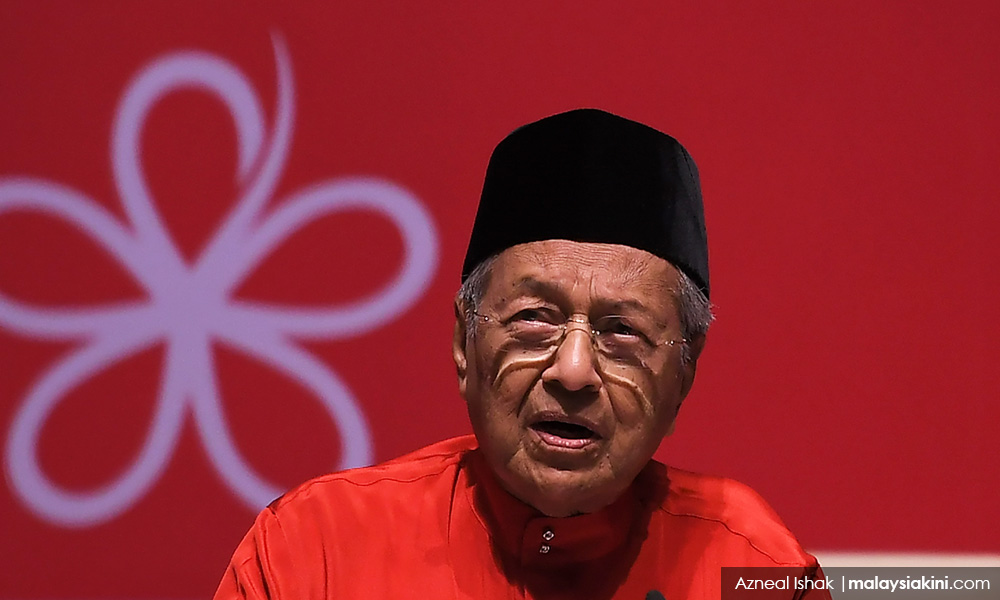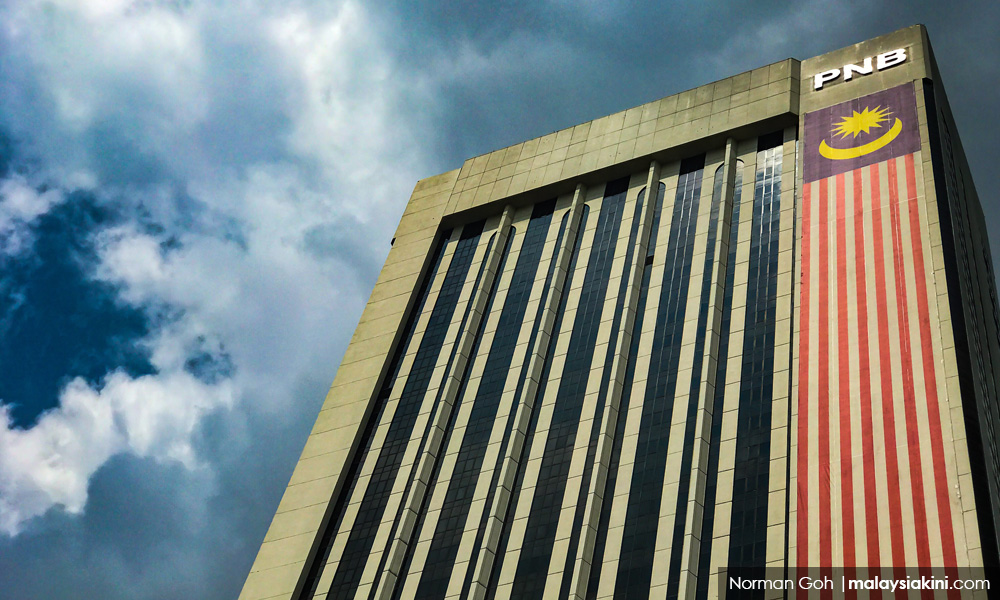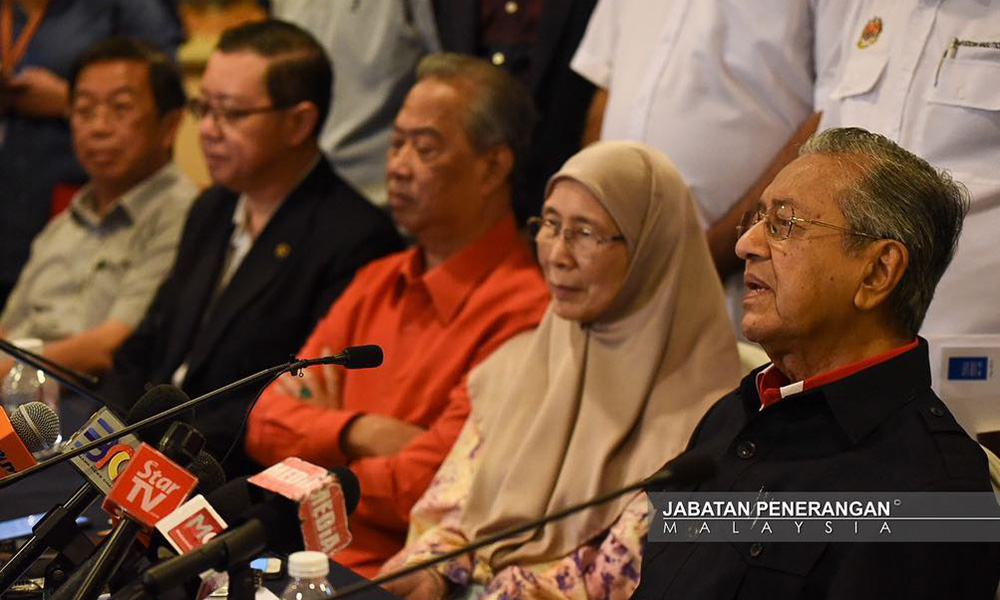
QUESTION TIME | When Prime Minister Dr Mahathir Mohamad sunk low to say that wealth should be distributed equally among races, he indicated plainly that he has no solid plan to increase incomes and alleviate poverty for all Malays and Malaysians. Jaded and faded, his priorities are elsewhere.
Note that he talks about the distribution of wealth, not increasing incomes, which is more important because this is what will eventually result in a proper redistribution of wealth by valuing everyone’s contribution fairly to wealth creation.
During his time as prime minister previously for a very long 22 years from 1981 to 2003 out of 46 years since independence at that time - nearly half the period of independence - he had plenty of opportunities but squandered them.
He did not care for the common Malay but was instead more focused on creating Malay billionaires overnight through the awarding of lucrative operations handled by the government or government companies previously, such as roads, independent power producers, telecommunications operators and others.
He depressed labour wages by bringing in millions of workers from Indonesia, and subsequently, Bangladesh and the Philippines to alter the religious balance in Sabah. A significant number of them became Malaysian citizens over the years, altering the overall racial and religious balance in the country itself.
By doing that he betrayed his own race, many of whom were workers and small entrepreneurs whose incomes were constrained by imported labour. Even now, Mahathir has not shown a great willingness to increase minimum wages, which will help many poor Malays and bumiputeras increase their incomes.
As Mahathir himself well knows, distribution is not an easy thing. Stakes held by others cannot be simply distributed but they have to be sold, even if it is at depressed prices as it was under the New Economic Policy or NEP, when companies wanted to get listed.
Instant millionaires
There are not enough Malays rich enough to buy these stakes, but many of them in the Mahathir era and earlier, especially the connected elite, became rich by purchasing the 30 percent stakes to bumiputeras that had to be divested upon listing by taking bank loans.
By simply flipping the stakes on the market at a higher price after they were listed, they pocketed the difference and became instant millionaires.

It was Mahathir’s brother-in-law - the straight, honest and capable Ismail Ali - who was the architect behind the setting up of Permodalan Nasional Bhd or PNB to hold in trust for bumiputera stakes in major companies. PNB now has funds of some RM280 billion and has been enormously successful in this respect.
But Mahathir, with advice from Daim Zainuddin who became his finance minister, still cultivated selected bumiputera leaders, many of them Daim’s cronies, and gave them plum deals. A slew of them who were terribly over-leveraged got into trouble during the 1997/98 financial crisis.
The government, often through Khazanah Nasional Bhd, had to rescue some of the biggest ones, resulting in Khazanah holding key stakes in many companies such as Axiata, CIMB, PLUS and so on. But recently, the government has been talking about, not surprisingly, selling these stakes to investors, accusing Khazanah of not developing bumiputera entrepreneurship, which was not anywhere in its original aims.
It becomes more obvious what Mahathir is talking about. Redistribution of wealth now will come out of the selling of government (Khazanah) and PNB stakes to individual Malay entrepreneurs to equalise wealth distribution among the races. To make it more palatable, some Indian entrepreneurs, too, may be found.
The modus operandi will be to sell the stakes when prices are depressed and perhaps even to offer a bulk discount to these so-called entrepreneurs, who of course will not only be among the elite but who are Mahathir/Daim cronies. That will ensure a steady flow of funds into Bersatu in future from donations to help make it the premier party in the Pakatan Harapan coalition.
Mahathir knows full well that equal wealth distribution is impossible - it’s never been done anywhere before and makes wealth acquisition disproportionate to intelligent effort and hard work, a sure recipe for inefficiency, corruption and patronage. As eloquently argued by prominent political economy professor Terence Gomez, patronage is king in new Malaysia - if it was cash during Najib's time.

Mahathir does not have the wherewithal to lead anymore, if he ever had it in the first place. Eight months after GE14, he is still bereft of a plan to increase incomes and improve livelihoods. He needs to recognise he does not have one and that he stays in power because of the strength of other parties in the coalition.
Wrong direction
The only way to close the wealth gap is to increase future incomes across all races. Anything else is the expropriation of other people’s wealth. In the meantime, the holding of wealth in trust by state agencies is perfectly acceptable because the income comes back to the government.
This can be wisely used to improve the quality of education, get better quality investments in, raise productivity and hence labour wages, and provide equal opportunities for growth and innovation among all communities. As so many people have said before me, you can equalise opportunities but not outcomes.
So far, 61 years of Umno-BN have not managed to equalise opportunities for all as the government education system is in shambles, among others. And eight months of Harapan is heading in the wrong direction under Mahathir.
Despite Bersatu being a party expressly formed to fight for Malay rights, Mahathir’s party had the lowest support from Malays of parties looking after Malay rights, including Umno, PAS, PKR and Amanah.
He is still stuck in a mode to widen his rather narrow and vulnerable power base (his Bersatu won only 13 seats of 52 contested, the worst win rate of any party in the coalition) unethically by attracting tarnished MPs from Umno into the Bersatu fold, in the process willing to break agreements with other coalition partners and doing/advocating things which are against the principles of a properly functioning democracy.
He has also said he will not honour some manifesto promises, saying that these were made when Harapan did not expect to win the elections - a rather lame excuse. He has not even made solid moves to undo repressive laws introduced by his predecessor Najib Abdul Razak.
Mahathir obviously has no plan to improve the livelihood of the common Malay and all Malaysians, stuck in old-school forced distribution which is injurious to the economy, maybe even fatal in the long term. High time he made way for someone else who may.
True Malaysians don’t want the creation of Malay (or any other ) billionaires from government wealth.
P GUNASEGARAM says old wine in a new bottle is still sour. E-mail: t.p.guna@gmail.com - Mkini



No comments:
Post a Comment
Note: Only a member of this blog may post a comment.